
Home / EV Charging News / The Benefits of Electric Car Sharing: How electric car sharing programs can promote sustainable transportation and reduce the number of cars on the road
Electric car sharing is a transportation model that allows individuals to rent electric vehicles on a short-term basis. These programs can be run by private companies or public entities, and are often available in densely populated urban areas. Electric car sharing programs usually require users to sign up for a membership, which allows them to access the vehicles using a smartphone app.
Once signed up, users can locate available electric cars using the app, and reserve a vehicle for a specific period of time. They then use the app to unlock the car and begin their rental period. At the end of the rental period, the user simply parks the car in a designated spot and ends the rental using the app.
Examples of electric car sharing programs include Zipcar, car2go, and BlueSG. These programs have grown in popularity in recent years, as more people look for sustainable transportation options that are more convenient and cost-effective than owning a personal vehicle.
There are several benefits of electric car sharing programs, including:
One of the key benefits of electric car sharing programs is that they can reduce the number of cars on the road. By providing a convenient and cost-effective alternative to owning a personal vehicle, electric car sharing programs can encourage people to use public transportation, walk, or bike instead of driving. This can help reduce traffic congestion, which can lead to time and cost savings for individuals and businesses.
Several cities around the world have implemented successful electric car sharing programs, including Paris, Barcelona, and Shanghai. These programs have had positive impacts on urban design and city planning, as they encourage the use of alternative transportation modes and reduce the need for parking facilities.
Despite the benefits of electric car sharing programs, there are several challenges and limitations to their implementation. One of the biggest challenges is the need for infrastructure, including charging stations and designated parking spots. In addition, regulations and policies may need to be put in place to ensure the safety and reliability of the electric car sharing programs.
Accessibility and affordability can also be limitations for some individuals. Electric car sharing programs may not be available in all areas, and some users may not have access to a smartphone or credit card, which are often required for membership and payment.
To address these challenges and limitations, governments and businesses can invest in the infrastructure needed for electric car sharing programs, and develop policies and regulations to support their implementation. In addition, efforts can be made to improve accessibility and affordability for all individuals, such as offering subsidies for low-income users and partnering with community organizations to provide more accessible options.
Another potential limitation is the range of electric vehicles. While this issue has improved in recent years with the development of more advanced battery technology, electric vehicles still have a limited range compared to gasoline-powered vehicles. This can be a concern for users who need to travel longer distances or who may be using the vehicle for a longer period of time.
Electric car sharing programs have the potential to promote sustainable transportation and reduce the number of cars on the road, leading to benefits for individuals, communities, and the environment. While there are challenges and limitations to their implementation, efforts can be made to overcome these obstacles and promote the growth of electric car sharing programs. By investing in the infrastructure needed for these programs and developing policies and regulations to support their implementation, governments and businesses can help create a more sustainable future. As individuals, we can also support the growth of electric car sharing programs by using these services when they are available and advocating for their expansion in our communities. Together, we can work towards a more sustainable and equitable transportation system.



